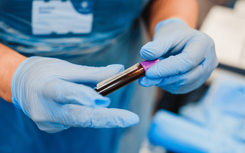
The Complete Guide to the Different Types of Cholesterol
Cholesterol is a type of blood fat that plays an important role in our bodies. But if our cholesterol levels get too high, it can increase the risk of coronary heart disease, leading to heart attacks and strokes.
However, it's not just about having high or low levels; different types of cholesterol serve various roles in the body. Some types are known as 'good' cholesterol, while others are labelled as 'bad' due to their impact on health.
In this guide to the different types of cholesterol, we explore the roles the main types of cholesterol play in our body, what are considered healthy levels, and how Bluecrest Wellness can help you monitor your cholesterol levels.
What is Cholesterol?
Cholesterol is a type of blood fat mainly made in the liver. However, it can also be found in some foods, like red meat, full-fat dairy, and fried foods.
Although cholesterol is often thought of as ‘bad’, cholesterol is important for brain, nerves, and skin health and is present in every cell in our body.
Cholesterol has three main jobs in the body:
- It makes up part of the outer layer or membrane of all body cells
- It’s used to make vitamin D and steroid hormones, which help to keep bones, teeth, and muscles healthy
- It’s used to make bile, which helps us digest the fats we eat
Although cholesterol is important to the normal functioning of the body, too much can cause problems like putting you at increased risk of coronary artery disease (the most common type of heart disease) and can increase your risk of heart attacks and strokes.
What Are the Different Types of Cholesterol?
Different types of cholesterol are categorised by the density of lipoproteins. A lipoprotein is a little parcel made of cholesterol fat and protein molecules. Lipoproteins enable cholesterol, a type of waxy fat, to travel around the body in blood, as fats cannot travel in the blood on their own.
Lipoproteins containing more protein are heavier and are classed as ‘high density’, while those that contain less protein and more fat are known as ‘low density’.
The two main types of cholesterol are LDL cholesterol and HDL cholesterol. However, there are other types of cholesterol, including:
- Very low-density lipoproteins (VLDL) – These are large and contain lots of fat and very little protein. They carry some triglycerides (another type of blood fat) and cholesterol from the liver around your body. Like LDL cholesterol, too much VLDL cholesterol in your blood can cause your artery walls to clog up.
- Intermediate-density lipoproteins – These are VLDL lipoproteins that have had some of the triglycerides taken out of them. They sit between VLDL and LDL in terms of how much fat they carry.
- Chylomicrons – These are the largest lipoprotein and carry glycerides from the gut to the liver after a meal. They are usually broken down in the liver, and the fats are repackaged into other lipoproteins.
LDL Cholesterol
LDL cholesterol or low-density lipoprotein is often known as ‘bad cholesterol’. Too much LDL cholesterol circulating in the blood can lead to atherosclerosis, a build-up of fats, cholesterol, and other substances, known as plaque, in and on the artery walls. This causes arteries to become narrowed, which can slow down or even block blood flow and lead to conditions like angina, heart attacks, and strokes.
A healthy level of LDL cholesterol is considered to be below 3.0mmol/l.
HDL Cholesterol
HDL cholesterol, or high-density lipoprotein, contains lots of protein and relatively little fat and is often known as ‘good’ cholesterol. HDL cholesterol has three main roles:
- Removing excess cholesterol from blood vessels and cells
- Playing a role in the inflammatory effect by protecting the artery wall against LDL cholesterol
- Having an antioxidant effect which helps protect cells and chemicals in blood and tissues from being broken down
Higher levels of HDL cholesterol are generally associated with better protection against coronary artery disease and associated conditions. Generally, health levels of HDL cholesterol are considered to be:
- Above 1.2mmol/l for women
- Above 1.1mmol/l for men
However, it is now acknowledged that levels above 1.4mmol/l may not offer any additional protection.
Numerous factors can affect the levels of different types of cholesterol circulating in your blood. Some of these factors are non-modifiable, like your ethnicity or genetic make-up, while others are modifiable, meaning you can make changes that help improve your levels.
Factors affecting different types of cholesterol include:
- Diet – Eating lots of food high in saturated fats and cholesterol, like full-fat dairy, baked goods, and fried foods can increase your LDL cholesterol levels.
- Weight– Being overweight tends to increase the levels of LDL cholesterol circulating in your blood and decrease levels of HDL cholesterol.
- Physical activity – People who do not exercise regularly are more at risk of weight gain which can lead to higher levels of LDL cholesterol.
- Smoking – Smoking is known to reduce levels of HDL cholesterol in your blood which can in turn increase your levels of LDL cholesterol.
- Age – People’s LDL cholesterol levels tend to rise as they age.
- Sex – Before menopause, women generally have lower total cholesterol levels than men of the same age. However, after menopause, women’s LDL levels tend to rise.
- Genetics – High cholesterol levels can run in families, so if you have a close family member with high cholesterol, you may be at greater risk of developing high levels.
- Some medicines – Some steroids, blood pressure, and HIV medications can raise LDL levels.
- Medical conditions – Chronic kidney disease, diabetes, and HIV can all increase cholesterol levels.
- Race/ethnicity – People from certain ethnic groups are at higher risk of having high cholesterol levels.
What Are Healthy Levels of Cholesterol?
When you have your cholesterol levels tested, you should receive a total cholesterol (TC) level as well as a breakdown of the main different types of cholesterol. You may also get a ratio of total cholesterol to HDL cholesterol reading (TC:HDL ratio).
Total Cholesterol
Sometimes written as your serum cholesterol or TC, this reading refers to your overall level of cholesterol circulating in your blood.
Non-HDL Cholesterol
The non-HDL cholesterol reading is your total cholesterol level minus your HDL cholesterol reading, so indicates all the bad cholesterol circulating in your blood including LDL, VLDL, and chylomicrons. Ideally, this reading should be as low as possible.
HDL Cholesterol
HDL or good cholesterol levels of up to 1.4mmol/l are thought to offer the best protection against a range of common heart conditions. However, levels above 1.4mmol/l are not thought to provide any additional protection.
TC:HDL Ratio
A TC:HDL ratio is the ratio of HDL cholesterol compared to total cholesterol. If you are not provided with a TC:HDL ratio, you can work it out for yourself by dividing the total cholesterol by HDL cholesterol. Your TC:HDL ratio should be as low as possible, with ratios above 6 considered high.
Healthy Cholesterol Levels
The below table provides a general guide to ideal cholesterol levels for healthy adults. However, if you already have a health condition like diabetes, your doctor may advise you to aim for levels below these recommendations.
| Mmol/l | |
|---|---|
| Total cholesterol | Below 5.0 |
| Non-HDL cholesterol | Below 4.0 |
| LDL cholesterol | Below 3.0 |
| HDL cholesterol | Above 1.0 for men, above 1.2 for women. 1.4 is considered ideal as above this figure may not give you any extra protection |
| TC:HDL ratio | Above 6 is considered high risk – the lower the figure the better |
How Can You Lower Your LDL Cholesterol Levels?
There are two main ways to lower your LDL cholesterol levels - lifestyle changes and management with medications.
Lifestyle Changes
One of the best ways to help reduce levels of LDL cholesterol is to make lifestyle changes like limiting the amount of saturated fats you eat, trying to lose weight if you are overweight, increasing the amount of physical activity you do, and stopping smoking.
Management with Medications
If lifestyle changes alone do not reduce your LDL cholesterol levels enough, you may also need to take medications. One of the most commonly prescribed cholesterol-lowering drugs are known as statins. As with all medications, statins can have some side effects, so it is important to speak to your doctor or book a private GP Consultation to decide if managing your cholesterol with medications is the best course of action for you.
How Can You Check Your Cholesterol Levels?
It’s easy to check your cholesterol levels with a simple blood test. A trained Health Assessment Specialist will take a blood sample from a vein in your arm using a small needle. Once the needle is inserted, a small amount of blood is collected into a test tube, which is then sent to a lab for testing.
At Bluecrest Wellness, our cholesterol test is a quick, easy, and accurate way to gain insights into the levels of different types of cholesterol circulating in your blood. The tests are included as standard in our full-body health assessment packages to give you comprehensive insights into your general health.
Learn How Bluecrest Wellness Can Help You Monitor Cholesterol Levels
The best way to maintain healthy cholesterol levels is by having regular cholesterol blood tests so you can make proactive changes to help reduce your levels if they start creeping up.
At Bluecrest Wellness, we offer private cholesterol blood tests to give you vital insights into the different types of cholesterol circulating in your blood.
Cholesterol blood tests are included in all our private Health MOTs to provide you with comprehensive insights into your overall health and wellbeing. Our full body health checks also include key metrics like your blood pressure and weight as well as your risk of some common medical conditions, like diabetes to give you a better picture of your general health.
With all our tests use the latest technologies to provide accurate results and provide a comprehensive Results Report and free access to a 24/7 GP helpline for a year for complete peace of mind following your health assessment.
With testing locations nationwide, it is easy to find a convenient location near you.
























